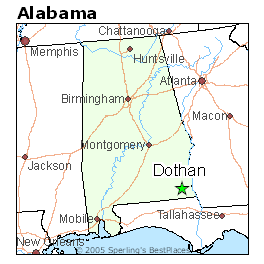In 2009, Larry Blumberg had a dream to revitalize the Jewish community of Dothan, Alabama (his home town). To attract new members, he offered to pay up to $50,000 for each family that was willing to relocate. 11 families were brave enough to move; over a decade later, seven of them have left.
The Priddles have stayed, but they’re not sure if they can endure it much longer. Their story was recently featured in The Washington Post and it’s garnered a lot of attention.
Their litany of complaints about Dothan is endless: not enough Jews, not enough activities, not enough jobs, rampant but covert anti-Semitism, separation from their grown children and grandkids, and, most of all, too much Southern-style Evangelical Christianity.
Lisa Priddle “wonders why she is trying so hard” when the local Methodist church doesn’t seem enthusiastic about her Hanukkah discussion. She and husband, Kenny, are “committed to teaching tolerance by example” and “sharing their faith” so everyone can enjoy an “open dialogue.”
Unbelievably naïve yet well-meaning, the Priddles evidently thought they could make rural Alabama into something that it will never be—a northern metro area with lots of Jews, Jewish awareness, and Jewish activities.
This is not uncommon for Jews who come from NY, LA, or Miami. They truly live in a bubble, with no idea what mainstream America is like and how small towns operate. Rural Judaism is so different from Metro Judaism, it’s hard to accurately describe it; you won’t understand unless you’ve lived it.
Because I was born and raised in New Hampshire, I get it. In small Jewish communities, we don’t expect all of the luxuries that folks in NY consider necessity—numerous temples, community centers, Kosher markets, Kosher restaurants, school boards that know when High Holidays are scheduled, etc.
When I was growing up, we were taught that Jews would always be a minority and we have to fit into the greater society, not vice versa. Of course, we refused to accept discrimination, abuse, or intimidation, but when it came to other people’s religious beliefs or personal opinions, we never tried to change their minds by “sharing our faith” and attempting to “create open dialogues” like the Priddles long to do.
Judaism does not recruit and it does not proselytize. Evangelical Christians, who make up 86% of the Alabama population, do both and they do it often. If the Priddles thought they were going to change Alabama, they are sorely mistaken, and it’s no wonder they’re unhappy.
Families who move to Dothan need to have the right mindset. They can’t build another NY in the South, especially in a tiny temple. It takes a strong faith to stand alone, to have a Pioneer spirit, to withstand isolation. Most folks aren’t cut out for it. That’s perfectly ok, but the problem isn’t the experiment, it’s the participants.
Another thing I found interesting about the Priddles is that both husband and wife converted to Judaism as adults. While I have nothing against converts, I have noticed that they seem to crave community interaction much more than Jews by heritage. Those of us who are raised Jewish from birth have always been considered different and we accept that as a part of life—unfortunate and unfair, yes, but that’s reality.
If the Dothan Jewish experiment is to continue—and I pray it does!—there will be inevitable growing pains. Temples are closing everywhere around America. The South, in particular, is going to be a hard sell for most Jews. In the future, they need to bring in younger people, with children, as opposed to retirees. Seniors are wonderful, but they tend to be very set in their ways.
Instead of focusing on the bad experience of one family, why not keep trying, keep tinkering, keep building a future—however, and with whomever, wants to join. Dothan, Alabama will never be Schenectady, NY. It has its own unique charm and the right families will see and embrace it. Most have left, more will go, but I’m still hopeful. I support Dothan; I support the experiment. The dream is never flawed, only the dreamers.
I am not meant to live in Alabama; the Priddles aren’t either, but some are. I wish those special souls well.






